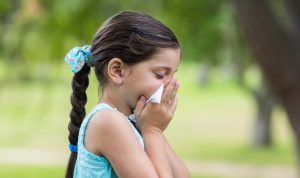Allergy March – Have You Heard Of It? By #AllergyFree- A Sanofi India Initiative
By Isha Kukde +2 more

Download PharmEasy App




Register to Avail the Offer
Send OTPBy continuing, you agree with our Privacy Policy and Terms and Conditions
By Isha Kukde +2 more
Very common in children, an allergy march is when a kid starts to get allergies in a specific order. It’s a condition that starts from eczema, then food allergies and hay fever, eventually leading to asthma. A lot of times people misunderstand mild symptoms which may lead to severe ones, but the development of these diseases is strongly influenced by both genetic and environmental factors. So, let’s look at how this allergic march or atopic march develops in children.
Table of Contents
The first stage is allergic sensitization, where a child shows IgE reaction to the food proteins during the first weeks or months. Most commonly developed from egg or cow’s milk, these strong IgE antibodies that respond to food proteins can be considered as triggers for atopic reactivity. Reaction to environmental allergens comes at a later stage as the outdoor allergens require exposure as well.

Dry, red, irritated and itchy skin is the most common symptom during atopic dermatitis. The skin develops small, fluid-filled bumps that ooze a clear or yellowish liquid. Gender difference also plays a role here as the reactions in boys are seen quite early in life, whereas the reactions in girls persist later in adulthood. The elevated rate of total IgE levels and a high degree of sensitization to food protein, has led to the misunderstanding that eczema triggers food allergy. But in most cases, the sensitization is only a complication of atopic march rather than a trigger to another condition.
Food allergy symptoms are far and many but most certain foods such as peanuts, tree nuts, fruits, vegetables allow a risk and potentially life-threatening anaphylactic reactions with significant IgE-responses. So far, the only treatment of food allergy in children is an elimination diet, which is necessary to be carried out for a few years. But high IgE levels from egg or cow’s milk have a less favorable outcome and longer persistence of the disease.
Seasonal allergic rhinitis generally doesn’t show up during the first two years of life. However, it’s possible for children to develop specific IgE-antibodies years before they manifest into something severe. An early reaction in children to grass or pollen allergens can indicate a high risk of rhinitis manifestation in the latter years of life. In some cases, children suffering from allergic rhinitis are known to be at high risk for future asthma manifestation.
Also Read: What Happens If You Eat Mold: Decoding the Potential Health Risks
Signs of asthma can be observed during an early stage of a child’s life. A majority of cases show symptoms of asthma such as asthmatic wheezing but very rarely does it persist throughout school-age and adolescence. The wheezing is not because of allergen-specific sensitization but because of virus infections such as RSV or rhinovirus, and the pattern may change later during school-age. Persistent wheezing shows a connection to indoor allergens like house dust mites and mold etc.

Prevention of allergic diseases and symptoms is the best possible way to fight off the allergic march. Early prevention is recommended which heavily relies on the prevention of triggers in healthy infants. Allergy prevention can be done with certain measures such as avoidance of early allergen contact from foods and inhalants and avoidance of pollution mainly indoor pollutants such as cigarette/tobacco smoke. It’s not necessary that if your child has eczema, they are certain to get the allergy march. It just means there’s a higher chance of it happening if the signs do show up seeking medical attention as soon as possible for the necessary allergy diagnosis.
For more information on how you can identify and manage allergies, visit http://bit.ly/allergy_free
Comments